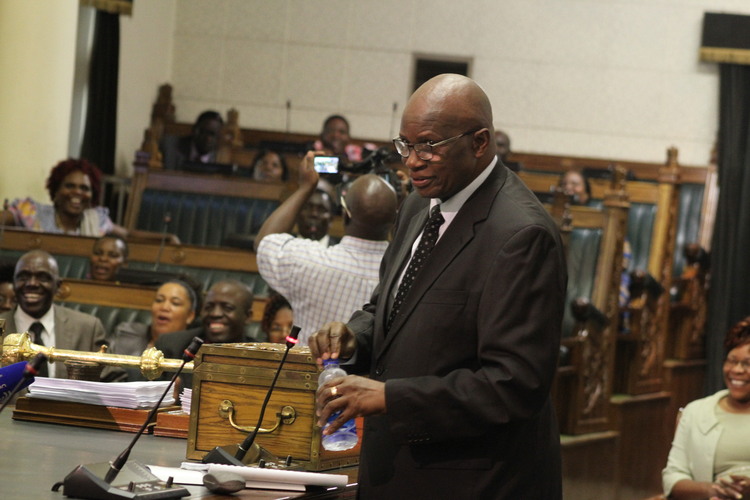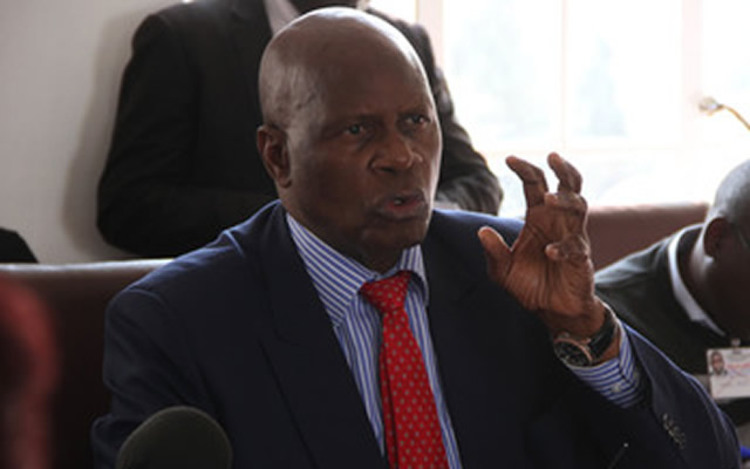
The Sunday Mail

Tinashe Farawo and Kuda Bwititi
Idle workers are largely responsible for Government’s bloated wage bill, and some departments should be realigned to streamline costs, the 2015 Civil Service Audit Report says. The State salary bill chews 83 percent of revenue, depriving authorities of fiscal space to embark on capital projects for socio-economic development.

Minister Chinamasa
Monthly, Treasury has to pull all the stops to meet civil service pay cheques while also grappling with competing national demands like food security.A physical head-count during the countrywide civil service audit determined the areas driving high labour costs.
It emerged during the survey that many civil servants lack job descriptions and are hardly contributing to public administration and the mix of Statecraft. Some have become redundant and others duplicate duties. Senior Government officials who have read the Audit Report told The Sunday Mail that it had been established that it was largely non-technical ministries that had much idle manpower.
The officials declined to provide further details as the report is still before the President. “There is a huge number of people who are literally doing nothing and it’s a cause for concern. Most employees who are idle are in a few ministries because the majority of Government departments are technical,” said one official.
“The audit showed that, for instance, there was no need for agriculture extension services to be based in urban areas. Instead, they are supposed to be on farms, advising farmers!” Another official said, “How can you find someone idle, say, in the ministries of Finance, Industry or Mining? These are technical ministries and in most cases, they employ economists, accountants etcetera.
“Maybe people who cannot be technical are your office orderlies, but, basically, everyone in most of our ministries are technical.”
In his Mid-Term Fiscal Policy Review Statement in July, Finance and Economic Development Minister Patrick Chinamasa revealed Government’s intention to reduce the ration of the civil service wage bill to revenue from 80 to 40 percent. Minister Chinamasa said then: “Cabinet has given a directive to the minister responsible for the Public Service and the minister responsible for Finance to urgently propose remedial measures to gradually bring down the share of the wage bill in the budget from over 80 percent to under 40 percent.
“Cabinet will be considering the full package of necessary proposals in the next couple of weeks. The above interventions to manage the wage bill are meant to create the fiscal space necessary to enter medium to long term growth for sustainable platform for improved remuneration.”
And IMF resident representative Mr Christian Beddies told The Sunday Mail that a six-member mission from the multi-lateral institution will be in Zimbabwe this week to consider wage bill reduction recommendations. He said various options to cut the wage bill were available, among them controlling staff recruitment; wage and incentive increases and centralising recruitment.
“This is a complex issue and cannot be solved overnight. Cutting the wage bill does not automatically mean that a large number of people will lose their jobs. “In the end, Government has to decide what type of civil service it needs and can afford, and the audit will help in that regard. The upcoming mission from our headquarters will, among other things, have an opportunity to discuss with the authorities its recommendations.”
Mr Beddies said workers who do not do any work should not expect to be paid. “Tackling the unsustainably large wage bill, over 80 percent of revenues, is important as the current expenditure mix leaves very little fiscal space for priority areas identified in Zimbabwe’s development blueprint, Zim-Asset.
“What other countries have done to address this issue is start with a detailed analysis of the public sector, based on the restructuring strategy of the public service that can be developed. Thus, the audit of the Civil Service the authorities have done is a very good step.
“Other measures include control over recruitment and staffing by freezing recruitment for about three to four years, with exception of critical/scarce skill gaps, based on clear guidelines on hiring, which is also underway. ‘‘Moreover, existing vacancies and those attributed to retirement should not necessarily be filled unless they are related to critical skill areas.”
He added: “Recruitment should also be done by a single ministry/the Public Service Commission in order to impede uncoordinated and ad hoc recruitment which leads to high costs, especially in the long run. This is also already underway and recruitments are being done with Treasury concurrence.
“Other measures countries have taken to contain the wage bill is to freeze increases of wages and benefits and provide incentives for voluntary retirement. ‘‘I think if you look at the (Staff Monitored Programme), the reforms contained therein are home-grown. That means there is ownership by the Government of Zimbabwe and we, as an institution, support these reforms.”



